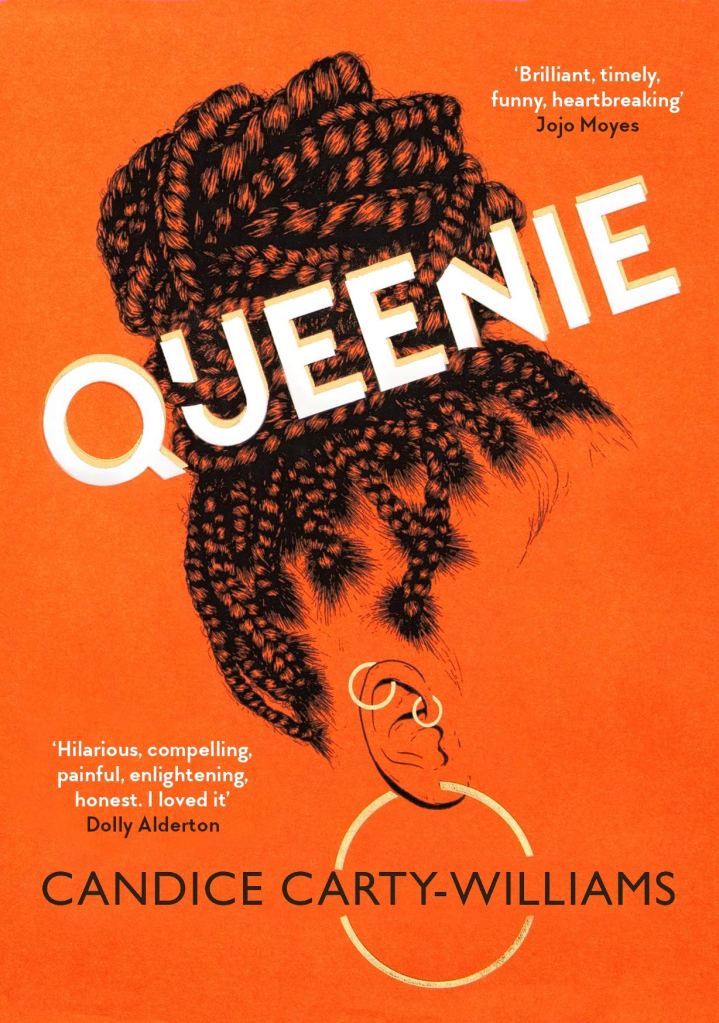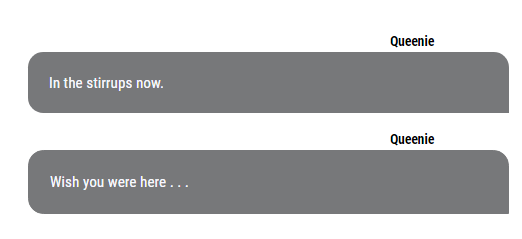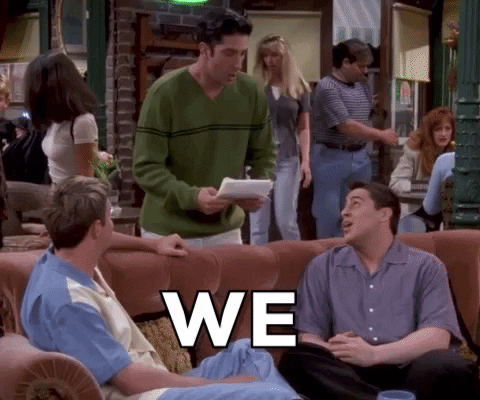
As opening lines go, Queenie has a fantastic opening – so to speak!

I LOCKED MY phone and carried on looking at the ceiling before unlocking it and sending a follow-up “xx.” That would prove to Tom that I wasn’t as emotionally detached as he accuses me of being.
I mean, it puts even Dodi Smith’s “I write this sitting in the kitchen sink.” to shame, doesn’t it! And it completely sets the tone for the whole novel: our protagonist, Queenie Jenkins, does not shy away from the physicality of the most intimate experiences in this novel. In fact, in many ways, she and Candice Carty-Williams increase the level of description and of frankness for the more intimate moments. The medical examination that the novel opens with, where the doctor “with no further warning inserted what felt like the world’s least ergonomic dildo into me and moved it around like a joystick.” Various increasingly unhealthy sexual encounters. In many ways the frankness of the novel and the honesty – at least in terms of the physical acts – of the the description, along with the dark comedy reminded me a lot of The Pisces by Melissa Broder. Or perhaps Fleabag.

Anyway, the novel opens with Queenie reeling from the revelation that Tom, her boyfriend with whom she lives, wants a trial separation or to “take a break” – and no, I cannot read that phrase without hearing it in Ross from Friends‘ voice… and that is a series which I did not find stood the test of time. However, Tom who is only really in the narrative once – save for a number of flashbacks – does come across as rather Ross-like.
Perhaps it was the tone of voice on the audiobook read by Shvorne Marks, perhaps Carty-Williams’ prose and dialogue, but Tom was so drippy that not for one moment did I share Queenie’s urgency to get back together with him. Why did she not see his acquiescence with his family’s casual racism? The grandma’s comment that their babies would be beautiful with
“Your lovely soft brown skin, Queenie, but lighter. Like a lovely milky coffee. Not too dark! And Tom’s green eyes. Your big hair, Queenie, those dark eyelashes, but Tom’s nice straight nose”;
the uncle who thought that Christmas games needed teams delineated by light and dark shirts; or who claimed that it was “the nigger in the pantry” in a game of Clue.
The worst thing that could have happened to Queenie was getting back with Tom.
But a lot of bad things do happen to Queenie: in her misery and with her lack of self-esteem, she seek validation in a range of utterly unhealthy relationships. Adi who “had been on my case relentlessly, before and after his lavish desi wedding to his girlfriend of eight years. Whenever I bumped into him, he’d talk very matter-of-factly and at excessive length about black women being forbidden fruit to Muslim men, but mainly he gave me lots of chat about big black bottoms”. Dates from OKCupid from men whose opening gambit was “My last girlfriend was black”, or “Chocolate girl ;)” or the classic ““Nice pics. How big would your tits be in my hands?” From This_Guy_Fucks.” Welsh Guy, who leaves sufficient injuries that the sexual health clinic is concerned that she is being pimped out. She feels herself becoming “some sort of male-voice-command-activated sex-bot.”
And it is very disturbing to read.
Bleakly comic at times, thanks to Carty-Williams’ prose and Queenie’s voice, but very disturbing. She comes across as very vulnerable – having lost her home, her partner and having her job in jeopardy – and manipulated, groomed and used by men. She is at least partially aware that this is what is happening as well but seems unable to resist. Which just makes it more appalling.
And it is not just the sexual exploitation that erodes Queenie’s self esteem: Carty-Williams’ relentlessly takes her life apart in the first two thirds of the novel. She discovers that she has (unbeknownst to her) had a miscarriage; she is compelled to move out of her home into a shared house; she loses focus in her job and may be about to lose it; she loses one of her friends – one of the wonderful WhatsApp group called The Corgies.
The novel, however, is not bleak and is genuinely funny throughout with very black humour. The strength for me was the ensemble cast of supportive friends: Darcy with whom Queenie works; Kyazike who is genuinely hilarious, militant and wonderful.
“How do you pronounce your name again?” Cassandra asked
“Chess-keh,” Kyazike said.
“Oh, okay, like Jessica without the ic in the middle?” Cassandra asked.
“No. Like my own name. Not some Western name. Chess-keh,” she repeated.
I loved Queenie’s grandparents as well with whom she has to go to live: the deeply religious, deeply Jamaican grandparents who had cared for Queenie when her own mother was unable to. Just listen to the voice that Carty-Williams creates when the grandmother finds out that Queenie is seeking counselling:
“You trying to shame all ah we?” she asked. Her eyes burned like hot coals…. “You know how much pain me carry?” My grandmother slammed her hand on the table. “You know how much pain I have to tek tru’ my yout’ and my twenties and beyond? You know what my madda, your grandmadda, woulda said if me did tell her me ah go seek psychotherapy? You mus’ be MAD…. None ah we well. Look at yo’ mudda, livin’ in hostel after that man bruk up her life and beat ’er and tek ’er money. Yuh tink she ah go psychotherapy? Ah you mek yourself lose your job becah you nah hold it together. You are nat going.”
Is it a little cliched? Is it a little stereotyped? Perhaps. As is the nearly silent grandfather. And the careful rationing of hot water. But the fact that there is a stereotype here does not mean that it is neither real not convincing nor, ultimately deeply moving as their love for Queenie proves to be far more powerful than their social taboos about counseling. And – oh! – the final restaurant scene when they discover that their drink is actually (mildly) alcoholic! It is wonderful.
At times I was not quite sure what the novel was about – was it about mental health, about being black, about being a woman…? and the answer to that is “Yes”. It is about all of that because it is at its heart a novel about its eponymous narrator, Queenie, who is a black woman whose mental health suffers. It is deeper and richer novel, in my opinion, than Eleanor Oliphant is Perfectly Fine with which is has a number of similarities – including a revelation of historic abuse, which is handled much more subtly by Carty-Williams. In comparison, Gail Honeyman’s revelation (which is powerful) is like a sledgehammer in the face for the reader… which is not a good thing, literally or metaphorically.
One thing I loved in this novel was the sense of place. The descriptions of London, of Caribbean South London, being gentrified and pushing the Caribbean population out so that, when searching for the simple comfort of a Caribbean bun, Queenie
“made it into Brixton Village and followed a route to the Caribbean bakery that was etched in my memories of Saturday shopping trips with my grandmother. I turned a corner and went to walk straight into the bakery, but was instead faced with a trendy burger bar full of young couples. The men were all wearing colorful oversize shirts, and their female companions were all wearing colorful overpriced coats….
How could [the rent] have been raised so much that people who were forced to come specifically to Brixton, to make lives here and create a community here, would be pushed out to make room for corporate-friendly burger bars?”
Very little in Queenie’s world is stable. Not her relationships, her home, her job, not even geography. Not even her own body. It is part of what makes her descent into fragility so very real and haunting – and makes us all cherish what remains as an anchor in our unstable world: our family, our friends. The people who see us at our most vulnerable and damaged and do nothing more than hold us.
This novel is so much more than a “black Bridget Jones” – so much more! And that tag seems to highlight a lot of the problems explored by the book: why do we expect black people to be black versions of white characters? It seems utterly disrespectful of the culture of others! I am hoping that, now it is long listed for the Women’s Prize it at least gets into the shortlist.
CONSIDER THIS BOOK IF YOU LIKED
- The Pisces, Melissa Broder
- Normal People, Sally Rooney
- Americanah, Chimamanda Ngozi Adichie
Ratings:
Overall:
Characters:
Plot / Pace:
Worldbuilding:
Language:
Publisher: Orion Trapeze
Date: 11th April 2019
Available: Amazon, Orion Trapeze


[…] The Book Lovers’ Sanctuary […]
LikeLiked by 1 person
Great review. I have heard of this book, but now I want to read it!
LikeLiked by 1 person
Thank you for that comment. I hope you manage to find a copy and enjoy it! Stay safe and well!
LikeLike
Great review! I like your point about how very little is stable in Queenie’s life, which makes her descent so real and haunting – I hadn’t thought of it in that way. I’m glad you enjoyed this!
LikeLiked by 1 person
[…] Queenie, Candice Carty-Williams – who doesn’t love a band named after the main singer, obviously without a surname! […]
LikeLike
[…] Wolf Hall Trilogy and Queenie Jenkins, the eponymous protagonist of Candice Carty-Williams’ Queenie. Just for giggles, I’d also like to invite someone from the fantasy genre and – whilst […]
LikeLike
[…] Queenie, Candice Carty-Williams […]
LikeLike
[…] the opening of Queenie has nothing equestrian about it! Candice Carty-Williams’ novel revels in the intimate as she […]
LikeLike
[…] Queenie, Candice Carty-Williams […]
LikeLike
[…] Queenie, Candice Carty-Williams […]
LikeLike
[…] Queenie, Candice Carty-Williams […]
LikeLike
[…] Queenie, Candice Carty-Williams […]
LikeLike
[…] Queenie […]
LikeLike
[…] Queenie, Candice Carty-Williams […]
LikeLike
[…] working class black women in their sexual realtionships. Luster is one in that tradition along with Queenie and Such a Fun Age. Edie was perhaps a less funny protagonist that Queenie but just as engaging, […]
LikeLike
[…] angst of some of the millenial characters I have come across recently in Luster, Exciting Times, Queenie, Such A Fun Age… and I say that knowing that it probably says a lot more about me and my age […]
LikeLike
[…] coy depiction of sex compared to some more graphic, biological entries in my reading recently. Queenie for example opens with a vaginal examination; The Pisces reveals more about mermen – and […]
LikeLike
[…] and themes: the intersection of race, women and sexual relations in the modern environment. Queenie, Such a Fun Age, and – albeit with mostly older protagonists and an ensemble cast – […]
LikeLike